On November 5, millions have been going to the polls to elect the next US president after four years of Joe Biden with the stakes for Africa varying considerably depending on who would occupy the White House until 2028.
In an interview, Dr. Alioune Aboutalib Lo, researcher at the AKEM Center in Istanbul, deciphers the potential impacts of a victory by Kamala Harris or Donald Trump on relations between the United States and the African continent.
Between diplomatic continuity, economic prospects and security challenges, the possible directions differ profoundly depending on the outcome of this election.
How could the election of Kamala Harris or Donald Trump influence diplomatic relations between the United States and African countries?
Dr Lo: Generally speaking, the United States’ interest in Africa remains minimal compared to the stakes and expectations. Regardless of the Americans’ choice, there should not be a major revolution in the United States’ Africa policy, which has placed its priorities elsewhere since the end of the Cold War.
However, we can expect more engagement from Democrat Kamala Harris, who is expected to stay in line with Joe Biden. During her tour of Africa in March 2023, notably in Ghana, Zambia and Tanzania, the American vice president said she was “enthusiastic” about the future of Africa and American-African cooperation.
This contrasts with Donald Trump, if we consider his first term, during which his political interest in Africa was almost non-existent, even though he launched his Prosper Africa economic initiative in 2018 to strengthen trade with the continent.
What consequences could the results of the American elections, whether Kamala Harris or Donald Trump, have on the United States’ trade and investment policies in Africa?
Dr Lo: The most important will be AGOA, the renewal of which will have to be decided in 2025. It should be noted that AGOA remains first and foremost a tool of coercive economic diplomacy (Economic Statecraft)
since African countries that do not align with the American vision of human rights and democracy can be removed from it, as was the case with Rwanda in 2018 (under Trump) or Niger and Uganda in 2023. This
policy should continue.
With regard to investments, the 2022 US-Africa Summit had helped restore the American desire to invest more in Africa, with in particular the promise of a financial windfall of $55 billion. Kamala Harris, who had also announced support for digitalization and innovation in Africa during her tour, should therefore follow this same path.
The United States is also keeping an eye on Chinese expansion in Africa and wants to compete with Beijing in this sector, with investments in strategic infrastructure. We can already mention American support for the Lobito Corridor project in Angola, which will also be essential for the trade of raw materials in southern Africa.
However, we can expect the same strategy of containing China by the United States in Africa, with Donald Trump. Competition with China on the economic front being an obsession for the Republican, his Prosper Africa initiative, launched to promote investment and trade with Africa, was particularly to be seen in the context of this competition with China and a response to his “new Silk Roads” project (Belt and Road Initiative).
How do Kamala Harris and Donald Trump approach security issues in Africa, and what impact could this have on American cooperation in the fight against terrorism and transnational crime?
Dr Lo: For the moment, this security aspect of American policy in Africa remains well relegated to the background in the American campaign. As stated above, Africa is not necessarily the priority issue currently in this American electoral phase.
But the fight against terrorism still remains of some importance for Washington. And in this perspective, the United States has special concerns, particularly regarding its military presence in the Sahel and competition from Russia. American troops were forced to leave Niger, where they had major military bases between Niamey and Agadez. Today, the challenge is to stay in the region. Côte d’Ivoire and Benin could host these troops, but in a West African climate that is increasingly hostile to the Western military presence.
Russia has especially gained legitimacy in this region with its presence in Mali, Niger and Burkina Faso, via its African Corps forces, which are intended to put Wagner’s forces under the wings of the Kremlin. The new administration, whether under Trump or Harris, should have geopolitical responses to this new situation.
How could the diplomatic and economic priorities of Kamala Harris or Donald Trump shape US cooperation with African countries in terms of development, humanitarian aid and governance?
Dr Lo: In general, Trump, who pays less attention to Africa, should probably be less careful about certain things, particularly governance or human rights. Republicans are less critical on these issues too, even if
Bush had changed that.
On the issue of humanitarian aid, on the other hand, Trump, who has a mercantilist perception of international relations, had wanted to cut several funding intended for it during his first term. A subject that
could come back on the table of Congress and call into question certain projects in Africa. The investments also announced at the last US-Africa Summit to support the development of the continent could be reviewed by the Trump administration if he returns to power.
However, where some Africans could prefer the Republican to Kamala Harris despite everything, is on the issue of LGBTQ people contrary to our traditional and religious values. Kamala Harris, who claims to be a great defender of this community, could further align American aid and investments with the promotion or decriminalisation of
homosexuality in African countries.
On this issue, there is a fundamental civilizational divergence between Harris and several African countries, which will not exist with Trump, who is rather conservative and even anti-LGBTQ. As in the more critical or more “paternalistic” tradition of Democrats, Kamala Harris should be more vigilant on issues of democracy and respect for human rights.
AC/Sf/fss/as/APA


